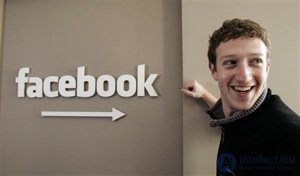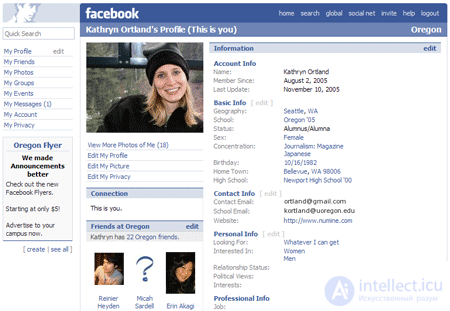Lecture

Probably, you already know what Facebook is and there is no need to describe well-known things to everyone? So I want to tell you the story of Facebook in my free statement. More precisely, the history of the creation of Facebook and its development to the level of the largest social network on a global scale.
Yes, Facebook , perhaps, is the most powerful social network in the world, which in a few years has evolved from a service for a small circle of friends to a global platform for communication. This word is now on the lips of every representative of the progressive young generation. Gradually, Facebook becomes an integral part of our life. And not by chance.
The history of the creation of Facebook began long before the final formulation of the very concept of “social network”. At the time of the birth of Facebook social networks in the usual sense we did not have. The history of the development of Facebook is also the history of the development of social networks.
Everything new on Facebook is copied by others and becomes the de facto standard. And that is why the Facebook story attracts so much attention. On her example, we study the experience of building a perfect new service, the experience of developing and implementing social services, and the experience of interacting with huge masses of users.
And now let's take a look at the history of creating Facebook a little more specifically and in more detail. In order to taste the experience too :)
The founder and "developer" of Facebook is Mark Zuckerberg - a young man who did not study at Harvard (just because of Facebook), with a non-standard look at the communication of people with each other.
The personality is rather contradictory. Someone thinks Zuckerberg is a disinterested genius who made all humanity happy. Someone - unprincipled thief, thinking only about getting a lot of money. Someone just lucky to create a service that is called "for themselves," which then "shot." There are many opinions.
Personally, I think Zuckerberger is a typical Jew, who clearly sees his goal and goes to it, not looking at anyone and not stopping at nothing. The whole history of the development of Facebook confirms this. What is the purpose? Wait and see.
Passion for computers at the youngest billionaire of our time - Mark Zuckerberg - appeared in the 6th grade. He began his thorny path with the well-known programming language C ++ and in his youth developed the computer game "Risk". Then there was the program that Zuckerberg created for his father. With the help of her employees of his company could communicate with each other.
After that, Mark programmed a special application called “Synapse”, which is able to automatically form listeners' “playlists” based on their musical preferences. The program was so successful that monsters like Microsoft and AOL turned their sophisticated views on it. KompaniyaBilla Gatesasracu offered Mark a good job (albeit, provided that all rights to Synapse are transferred to Microsoft). Being already a young man in his youthful years, Mark Zuckerberg refused.
He wanted more. And now we can say that then he did the right thing. By the way, this relationship between Mark Zuckerberg and Bill Gates does not end, but more on that later.

Many believe that the history of Facebook begins with the days of Harvard University, in which Mark entered the faculty of psychology. A talented programmer with great potential in the psychology department - it was a rather non-standard solution :-)
However, the story of the creation of Facebook began a little earlier - at Phillips Exeter Academy - a private school with rich traditions in New Hampshire. Rather, not the creation itself, but the accumulation of the basis on which Facebook subsequently grew.
As a student of this school, Mark Zuckerberg had at his disposal the so-called "The Photo Address Book". It was a kind of student handbook, where you could see photos, phone numbers and even the addresses of their classmates. The data in it was updated annually, so it was very convenient for each student.
Do you know how the students called this book among themselves? "The Facebook"! The reason is simple enough - the original name was too long to pronounce.
Enrolling at Harvard, Mark discovered that there was no such service at the university. He came up with the initiative to create an online directory of the “The Facebook” type for management. And was refused, which was based on the confidentiality of student data.
In narrow circles they say that this circumstance really infuriated a talented programmer. And he was not going to retreat.
One fine day (or night), Mark Zuckerberg hacked into the Harvard University database and created the simplest site, codenamed Facemash. The concept of this site was simple - photographs of female students were offered to the attention of visitors and the possibility of evaluating them according to a certain “scale” of attractiveness. The site was only available inside Harvard.
What came out of this is better to indicate in numbers and figures: 2 hours after the launch of the site - 450 visitors and 22,000 photo views! Notice - visitors were the same students of Harvard University. Those. 450 direct acquaintances of owners of photos uploaded in 2 hours!
As soon as information about such a “heroic” act reached the leadership of the educational institution, Mark Zuckerberg was no longer enraged. As a result, he received serious problems, and the site was safely closed. But if someone thought that Mark had stopped, he was deeply mistaken.
February 4, 2004 can be remembered for different events. For example, on this day at Sotheby's auction, the most avid collectors fought for the right to own the stunning “Great Dancer” sculpture by the hand of Edgar Degas. And on the same day, the social network “The Facebook” was launched in a small room at the Harvard University dormitory. Launched quietly, modestly and without fanfare.
The “starter” lineup, in addition to Zuckerberger, included three more students: Eduardo Saverin (as the first Facebook financier), Dustin Moskowitz and Chris Hughes (as program assistants).
Thus began the modern history of Facebook . The initial promotion and the formation of the starting audience was carried out with the help of the old and good SPAM. This is one of the most prominent examples in the history of the Internet, when SPAM gave a phenomenal result.
Around every brilliant idea is always going to a huge number of scandals. And the history of the creation of Facebook is no exception.
Exactly 6 days after the launch of Facebook, three undergraduates from Harvard University (Cameron Brothers and Tyler Winklevoss, as well as their friend Divya Narendra) accused Mark Zuckerberg of stealing their idea, on the basis of which, he said, he created Facebook.
They claimed that as early as 2003, Mark Zuckerberg was attracted (inspired by the “success” of his Facemash story) to create his own HarvardConnection.com service. They urged everyone and everything that a number of their personal ideas and developments, which they shared with Mark, were brazenly borrowed last when creating Facebook.
The details of this scandal are not particularly interesting, and the information about it is very contradictory. Let us dwell on the main points and this will be enough.
Offended high school students complained to the university management, and also convinced the editorial board of the university newspaper Harvard Crimson to publish an exposing article. This was facilitated by the appeal of another student, John Thomson, who claimed that Zuckerberg on Facebook used his idea.
The story of litigation and mutual claims lasted for several years. As a result, Facebook paid 65 million dollars in compensation: 20 million dollars in cash and 45 million dollars in the form of Facebook shares.
My opinion coincides with the opinion of other reasonable people who believe that Zuckerberg stole, if not completely, then a significant part of the idea from the Winklevoss brothers. And since they did not enter into any contracts with Zuckerberger when they were hired, Facebook’s history is connected with the name of Mark Zuckerberger, not the Winklevoss brothers.
Initially, “The Facebook” focused exclusively on Harvard University. For the first month of the social network, about half of Harvard students registered with it.
But in March 2004, The Facebook went beyond the walls of Harvard and connected students from Stanford, Columbia University and even Yale to its network. Mark Zuckerberg aimed at universities in the so-called “Ivy League”, which included all elite educational institutions. Then most of the largest educational institutions in the USA and Canada were gradually connected to Facebook.
Any development is impossible without active investments. At the time of the creation of “The Facebook”, there existed on the enthusiasm of fellow students and small financial investments Eduardo Saverin (whom Zuckerberg would later slyly “throw”, squeezing out of the company and leaving with a nose) to pay for server services.

But the time came when Facebook became so big that it demanded maximum attention. And in order that the history of its development was not interrupted, more considerable finances were required. Mark Zuckerberg leaves for Silicon Valley and settles in Palo Alto. There, he meets with Sean Parker, who went down in the history of the Internet, thanks to the creation of the Napster file-sharing network, which rallied numerous scandals and lawsuits with record companies. After the closure of Napster, Parker dreamed of working for a company that would turn the world around with his ideas.
Facebook just met this "requirement" of Parker. And Parker was needed by Zuckerberger because of his many acquaintances with the financial tycoons of Silicon Valley. As a result, at a certain stage in the history of Facebook, Parker and Zuckerberg were engaged in the development of the company together.
Sean Parker convinced Zuckerberg of the need to grow the project and attract third-party funding, in which he promised solid support.
The first Facebook investor was Peter Teale, one of the founders of the well-known PayPal payment system. His investments amounted to 500 thousand dollars. Thanks to this, in less than six months, “The Facebook” gathered the first million users. From this point in its history, the company has been actively engaged in venture investment issues.
In 2005, only for 200 thousand dollars in the domain name of a social network there was a slight change. The “the” prefix disappeared, and Facebook just appeared. After that, the social network has ceased to be positioned as a service focused exclusively on students. Anyone could register to communicate with their friends. In the history of Facebook, a new stage has begun.
The social network Facebook has begun to grow rapidly. When the number of users exceeded 50 million, Zuckerberg began to receive attractive offers.
For example, the monopolist Yahoo! offered for the entire project 900 million dollars. And received another refusal of Zuckerberg.
Here in the history of Facebook Bill Gates reappears, which buys back 1.6% of Facebook’s shares for $ 260 million. From this point on, the founder and ideological inspirer of Microsoft Corporation started his personal page on the social network. But if you think that Mr. Gates limited himself to this, then you are deeply mistaken.
After buying the shares, he entered into an agreement with Facebook, under the terms of which the social network posted on its pages to Microsoft advertising until 2011.
In 2008, Mark Zuckerberg became the youngest billionaire in world history - his fortune was estimated at $ 1.5 billion.
Among the shareholders of Facebook you can meet and Russian investors. In 2009, Digital Sky Technologies, which is controlled by Yuri Milner, Grigory Finger and Alisher Usmanov, acquired 1.96% of preferred shares for $ 200 million. Later, Russian investors bought another 3% stake. Today, the participation of Digital Sky Technologies is 10%.
The social network Facebook is actively developing and implementing its own API that allows you to connect numerous applications (games, informers, calendars, etc.). And on September 30, 2010, Facebook entered into an agreement with the telecommunications corporation Skype, so the integration of the two giants is expected in the near future.
Facebook representatives say that in 2011 the billionth user will register on the social network. And to achieve this mark tremendous efforts are being made.
To date, Facebook can be viewed in 68 languages. Advancement in many regions of our planet is complicated by the low-speed Internet. And in this direction serious steps are being taken - the creation of an easy version of a social network called “Facebook Zero”. Negotiations are also being held with representatives of cellular communication companies (including Beeline and MTS) on the possibility of browsing pages from mobile phones.
In the current 2011, the history of Facebook promises to be no less interesting. What is worth another lawsuit Winklevoss brothers, who again decided to "shake" the wallets of the founders of the social network. At this time, the brothers financial appetite has increased substantially. Specific amounts are not called, but according to some sources, we can expect a claim of $ 500 million and above.
Perhaps the insatiable millionaire brothers should direct their efforts to the realization of their main dream - getting into the Olympic rowing team at the games in 2012? In any case, now the whole world is waiting for the next brave
For most people in the world, the word “social network” immediately has the image of Mark Zuckerberg's brainchild - Facebook. This is not surprising, since today Facebook is the most popular social network in the world. So, recently a 120 millionth user has registered on the network.

In addition, Facebook today is the best embodiment of the company of the XXI century. Zuckerberg founded his network only four years ago, and books and articles about it were already published about it. What is the uniqueness of Facebook? Let's try to figure it out together, having considered the whole way of creating the project by Mark Zuckerberg.
Talented young man
Bill Gates, Sergey Brin and Larry Page, Mark Zuckerberg. What unites these people? First of all, they seriously stand out from the crowd. They differ in non-standard thinking and dissimilarity from those around them. They are difficult to understand, but what they do really changes the world. Thanks to Facebook, people all over the world can easily keep in touch with all their friends.
Previously, society simply did not have such an opportunity, but now everything has changed. Classmates are no longer lost after graduation, and all friends are in full view. In this case, communication between people is not only in direct correspondence. Facebook is a content project, when you can look at how a person lives with the help of his photos, videos, some notes and much more.
However, Facebook is not limited to communication of familiar people. Numerous interest groups help to rally people around. Fans of Apple technology can communicate in the appropriate group, and lovers of opera music in their own. This is not counting the fact that Facebook is also a huge base of profiles, surpassing the most popular dating sites. And the possibilities for finding your second half are impressive.
Thanks to Facebook, even the model of dating between people on the street has changed somewhat in the USA. It doesn’t surprise anyone when a girl, instead of her phone, reports an address on Facebook so that the young man can add her as a friend. It is much more convenient than giving your number to a stranger. With Facebook, you can easily find out how a person lives, look at his friends, photos, and eventually decide whether it is worth trying to start a relationship with him at all.
Not just ordinary people are reaping the fruits of Mark Zuckerberg's brainchild. Many companies are now looking for employees using Facebook, checking candidates for vacancies using this social network and communicating with customers! And if you remember the number of Facebook clones around the world (in Russia, such a clone is the “V Kontakte” network), then the scale of the company's success becomes clear. But how did the story of Facebook begin?
Mark Zuckerberg was born on May 14, 1984 in Dobbs Ferry (New York). Since childhood, he has proved himself as an inquisitive young man. So, he was fond of antiquity for a long time and seriously studied ancient languages. When Mark was in the 6th grade, he discovered the amazing and exciting world of computer programming. At that time, almost all young people of his age began to get involved in computers, so it is not surprising that Mark started programming. His first language was not at all Basic or Pascal (as most beginners programmed), but a serious and many-sided C. The fascination with ancient languages helped Zuckerberg quickly master a difficult computer language.
Already in the 9th grade, he presented his small game called “Risk”.But real success came to Mark a little later, when he was studying at a boarding school in the city of New Hampshire. There, the young man wrote a supplement for the Windows media player that analyzed the taste preferences of users, and then collected his playlists on a computer from a music library. Apple introduced a similar feature for iTunes at the end of 2008, and Mark Zuckerberg even before the founding of Facebook.
The plugin created by the young genius was named Synapse. It was quickly noticed by large companies, such as Nullsoft, which deals with the release of the popular WinAmp program and Microsoft itself. Mark was even offered $ 2 million for his development, but he refused and went to study at Harvard. I already said that he is not an ordinary person.
Интересно то, что компания Microsoft очень хотела нанять Цукерберга, как программиста, когда он только закончил школу. Предложение было очень выгодным и соблазнительным для молодого человека. Оказаться в крупнейшей компьютерной компании, не имея высшего образования. Это феноменально. Но совершенно не устраивало Марка. В Гарварде он поступил на факультет психологии. А Microsoft так и не приобрела столь ценного сотрудника.
Институтские годы для Марка запомнились тем, что, во-первых, он достаточно хорошо учился, а во-вторых, сумел отметиться, взломав сервер университета. Все дело в том, что в то время у Гарварда присутствовал специальный сервер, на котором хранилась вся информация об учениках данного заведения, включая их фотографии и дополнительные данные. Цукерберг взломал сервер и создал небольшое приложение, суть которого заключалась в том, что оно выводило попарно фотографии студенток Гарварда, а пользователям предлагалось выбрать ту, что симпатичнее. За такое нарушение Цукерберг получил серьезный выговор, но комиссия не преминула отметить, что Марк является чрезвычайно талантливым компьютерным специалистом.

Именно во время учебы к Цукербергу пришла идея создать сайт Facebook. Изначально он работал с группой ребят над проектом ConnectU, который по своей сути был прообразом Facebook. В данном предприятии Цукерберг выступал в роли программиста. Но в один прекрасный день он сообщил своим партнерам, что не будет заканчивать сайт. Через некоторое время на свет появился Facebook. Представители ConnectU утверждали, что Цукерберг украл их идею. Возможно, так оно и было, но это уже не важно.
Рождение Facebook
Таким образом, 4 февраля 2004 года на свет появилась сеть Facebook. Правда, пока она функционировала только в пределах Гарварда. Некоторое время спустя регистрация была открыта для всех студентов и школьников. Главным условием было наличие почтового адреса в зоне edu, которое и свидетельствовало о принадлежности человека к образовательному сектору.
Надо сказать, что на первых порах такая тактика отлично сработала. Проект привлекал к себе внимание, но в это же время его аудитория была достаточно высокого качества. При регистрации нужно было заполнить подробный профиль, а кроме email-адреса в образовательной зоне edu создатели требовали добавить еще и свою настоящую фотографию. Все анкеты, в которых люди использовали аватары, удалялись.
Soon the resource began to go beyond the educational sector, gaining more and more popularity every day. Zuckerberg started looking for investors. And found. Mark received the first money from one of the founders of PayPal, Peter Thiel, who is known throughout the Silicon Valley. The amount was only 500 thousand dollars, but this money was enough for the immediate purposes of Facebook. The project began to grow rapidly. Less than a year after its foundation, more than 1 million people used the social network. For the development of the project needed money, and they began to actively join Facebook. First Accel Partners invests $ 12.7 million into the network, and then Greylock Partners adds another $ 27.5 million to this amount.
By 2005, Facebook was accessible to all US educational institutions. Zuckerberg still believed that his project was a student network, but users' interest in Facebook grew exponentially. Then it was decided to open the project for everyone. Facebook has started an epidemic.

The main thing that immediately attracted users to Facebook is its main difference from other popular sites, like LiveJornal. First of all, they were sharpened to rally around themselves an audience that does not know each other in real life, and Facebook was made to connect with real friends. It was something new.
Facebook audience grew rapidly, but for a long time there was no talk about making money from a project. Everyone expected that the main tool should be contextual advertising. The fact is that on Facebook, each user fills in a fairly detailed questionnaire with which you can find out his interests. Obviously, this opens up sufficiently large opportunities for advertisers who can find an interesting audience. But Facebook has long continued to simply increase the audience. When it passed over 50 million users, large companies began one after another to make offers to purchase the Zuckerberg project. So, one time Yahoo! even offered $ 900 million for this social network. The sum is impressive, but it did not suit Mark at all.
In 2007, the most important event for Facebook happened. Microsoft has acquired 1.6% of Facebook shares for an impressive amount of $ 240 million. Based on this, many analysts have suggested that the total value of Facebook is 15 billion dollars. Not a weak result for a company whose revenues did not exceed 200 million a year. After the transaction, a rather interesting event occurred. Bill Gates himself has registered on Facebook. One time he spent several hours a day communicating with everyone via Facebook, but then he decided to delete his account, as there were too many of those who wanted to. He just physically did not have time to communicate with them. However, Gates has secured a serious Facebook PR worldwide. This is particularly important for Microsoft, given that it has an exclusive agreement with the Zuckerberg network,according to which is the main partner of Facebook in advertising.
Надо сказать, что общая стоимость Facebook часто вызывает споры среди аналитиков. Цена проекта обычно варьируется от 5 до 15 миллиардов долларов, хотя многие утверждают, что Facebook не тянет ни на одну из этих сумм. Все дело в том, что доходы компании пока не соответствуют ее примерной рыночной цене (Цукерберг ожидает, что в этом году Facebook заработает порядка 300 миллионов долларов). Об IPO Марк пока не задумывался. А тут еще финансовый кризис, который явно задвинул эту процедуру минимум еще на несколько лет.
If we talk about the atmosphere in the company, so far it has corresponded to the image of a technical startup. No dress code, free working day, founder moving in sandals - many of these things are still relevant for Facebook. True, since Cheryl Sanberg joined Google from the company, the situation has changed somewhat. Discipline in the company has become much stricter. Facebook is starting to turn from a startup into a corporation.
Technical innovations and opportunities for earnings
The final breakthrough for Facebook was the development of its API, which allowed thousands of developers around the world to write programs for the social network. Quickly enough, the project began to grow into small applications of varying degrees of utility. Various informers, calendars, organizers. But the main things were small games that simply flooded Facebook.
Interestingly, many developers have already earned serious money thanks to this platform. And Facebook, unlike Apple (the situation with the iPhone) does not take any money from them.
As for the models of earnings, then the company tries to try various options.
Selling advertising - this is not all. So, for some time on Facebook, each member of the network can order another completely real product, which can be obtained in a regular store. This is a simple gift that can be presented without leaving the cashier. What is needed for this? Pay for the goods, choose the recipient. He will have a special identifier that he will have to present in one of the stores collaborating with Facebook.
Another interesting way in which Facebook makes money is paid groups for companies. In general, many companies from the very beginning were engaged in creating their own groups on Facebook, but then the resource administration introduced a number of serious restrictions that complicated the interaction of the group’s audience with its creators. In particular, one of these restrictions was the limit on 1,200 messages per day that the group administrator can send. And if there are millions in it? Then the company will have to purchase a subscription to a paid group. Here the possibilities are extremely broad, there are no numerous limitations of ordinary groups and in general everything is done so that companies can communicate productively with customers. Even there is the possibility of styling a page for your corporate identity.
Today, Facebook has about 230 sponsorship groups, which bring the project $ 23 million per month. Among the companies that have organized their sponsorship groups, Apple, Nike, Victoria's Secret are particularly noteworthy.

Current situation
Now Mark Zuckerberg's company is committed to trying to take a strong position outside the United States. Here Facebook faced the problem of numerous clones of itself. For example, some time ago a Facebook version appeared in Russian, but it’s not particularly popular, since the “V Kontakte” ball rules here. In some situations, Facebook has already sued their clones.
In any case, at the moment the project of Mark Zuckerberg is one of the most significant resources on the Internet. Obviously, the boom on social networks will sooner or later pass, but Facebook is not threatened with a decline in popularity. This is a solid project that has firmly entered the lives of people around the world. It will just become the same norm as the phone, which is, but no one notices it, because everyone has got used to it for a long time.
The history of the creation of Facebook vividly confirms one simple idea - everything is just in your hands. You can, of course, look for a guy who does everything, and you just have to get a profit. Only in this case is a very great chance to fly like the Winklevoss brothers.
And you can not wait for the weather by the sea and implement your ideas with YOUR hands. Let it be clumsy, let them learn from their mistakes in the process, but in this case you will definitely not have to regret that someone was faster than you. It is much more profitable to get the necessary knowledge than to miss the “right of the first night” :-)
As for the development of Facebook, I think the idea itself has reached its peak. Further growth is only possible purely quantitatively. And only for a while. And then something new will appear on the Internet and Facebook will become “one of”.
If the story of Facebook has interested you and “there is no more strength”, then I advise you to read the book “Billionaires Unwillingly. An alternative history of creating Facebook . In her art form, the creation of Facebook is described in more detail. True, they try to make Zuckerberger white and fluffy, but this is the only drawback of this book.
Comments
To leave a comment
History of computer technology and IT technology
Terms: History of computer technology and IT technology